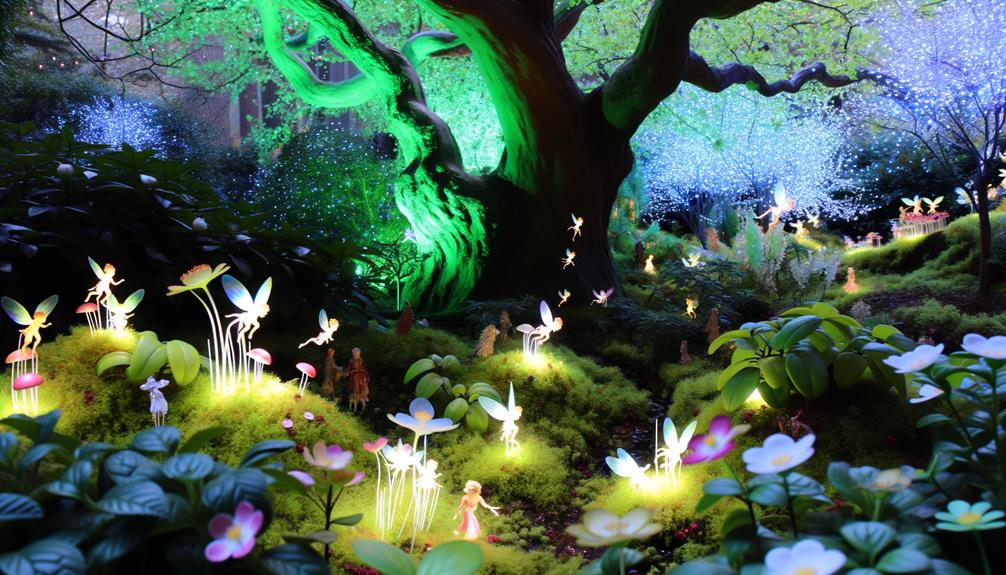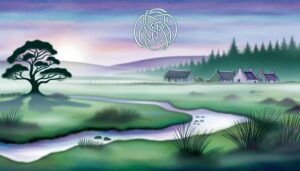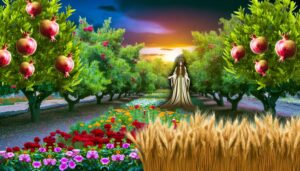Meaning of the Name Pixie
The name 'Pixie' has historical roots in Old English and Celtic folklore, deriving from the term 'piskie' and the Swedish dialect word 'pyske.' It traditionally denotes a type of fairy creature known for its playful and mischievous nature, deeply connected to the natural landscapes of Cornwall and Devon. In modern contexts, the name symbolizes charm and a free-spirited nature, gaining popularity as a given name and in commercial use.
Characters named Pixie often embody traits of mischief and magic. This evolution from myth to modernity reveals layers of cultural adaptation and contemporary significance.
Discover more beneath the surface.

Key Takeaways
- The name Pixie originates from Old English and Celtic folklore.
- Pixie signifies a playful, mischievous fairy creature associated with nature.
- It symbolizes charm and a free-spirited nature in modern use.
- Pixie is popular in English-speaking countries as a given name.
- The name evokes whimsy and magic in contemporary culture and media.
Origins and Etymology
Tracing its roots back to Old English and Celtic folklore, the name 'Pixie' is believed to derive from the word 'piskie,' which refers to mythical, mischievous creatures often associated with the countryside of southwestern England.
The etymology of 'piskie' is complex, potentially linked to the Swedish dialect term 'pyske,' meaning 'small fairy.' Historical texts from the 16th century first document the term, suggesting a linguistic evolution influenced by regional dialects and cultural exchanges.
The Cornish language also contributes, where 'Piskies' are integral to local legends. This multifaceted origin underscores a rich tapestry of linguistic and cultural interconnections, reflecting how folklore shapes and preserves linguistic heritage over centuries.
Understanding these roots provides insight into the cultural significance of the name.
Folklore and Mythology
In the rich tapestry of British folklore and mythology, 'Pixie' denotes a specific type of fairy creature characterized by its playful, mischievous nature and deep connection to the natural landscapes of Cornwall and Devon. These diminutive beings are often depicted as guardians of the moors and woodlands, frequently engaging in trickery but also assisting humans on rare occasions. Historical texts and oral traditions reveal various attributes and behaviors associated with pixies.
| Attribute | Description | Source |
|---|---|---|
| Appearance | Small, pointed ears, often winged | Local folklore, literature |
| Habitat | Moors, woodlands, natural landscapes | Cornish and Devonian mythology |
| Behavior | Mischievous, playful, sometimes helpful | Oral traditions, historical accounts |
| Cultural Impact | Inspiration for local festivals and tales | Regional folklore, community practices |
These elements underscore the pixie's integral role in the mythological fabric of the British Isles.
Modern Interpretations
Modern interpretations of the name 'Pixie' reveal a fascinating evolution from its mythological roots to its current cultural and commercial applications. Historically, 'Pixie' referred to mischievous, playful creatures in British folklore.
In contemporary times, the name has transcended its origins, being embraced in diverse fields such as fashion, entertainment, and technology. For instance, 'Pixie' now frequently appears as a brand name for products intended to evoke a sense of whimsy and creativity, ranging from cosmetics to children's toys.
Additionally, the name has gained popularity as a given name, symbolizing charm and a free-spirited nature. This shift underscores how modern society repurposes mythological elements to resonate with contemporary values and commercial interests.
Cultural Impact
The adaptation of the name 'Pixie' from folklore to contemporary usage not only highlights its versatility but also reflects its significant cultural impact across various domains. Historically rooted in Celtic mythology, 'Pixie' has transcended mere folklore to influence literature, media, and modern identity.
This transformation is evidenced in literature where characters named Pixie appear in various literary works, symbolizing mischief and magic. In media, the term is employed in films and TV series to denote whimsical or supernatural elements. Furthermore, in the realm of fashion, the 'pixie cut' hairstyle denotes an element of playfulness and nonconformity.
Moreover, 'Pixie' is increasingly chosen as a unique personal name, embodying a blend of tradition and modernity. This multifaceted impact underscores the enduring relevance of the name 'Pixie'.
Popularity and Usage
Frequently embraced across various demographics, the name 'Pixie' has witnessed a significant increase in popularity and application over recent decades. Historically rooted in folklore, 'Pixie' began to gain traction in the late 20th century, coinciding with a broader cultural fascination with whimsical and ethereal themes.
Usage data indicates a marked rise in the name's adoption, particularly in English-speaking countries. Importantly, 'Pixie' has transcended its mythical origins to become a favored choice in contemporary naming conventions, often symbolizing playfulness and individuality. This shift reflects broader societal trends toward embracing unique and imaginative names.
Additionally, the influence of popular culture and media has played a significant role in boosting its appeal, further embedding 'Pixie' within modern lexicons.
Conclusion
Coincidentally, the multifaceted name 'Pixie' intertwines historical etymology, rich folklore, and contemporary interpretations, creating a tapestry of cultural significance.
Its roots in ancient mythology and enduring presence in modern narratives underscore a timeless appeal.
The name's evolution and consistent popularity reflect societal shifts and the enduring human fascination with the mystical.
Analyzing its impact reveals a unique convergence of past and present, underscoring the name's profound resonance across different eras and contexts.






